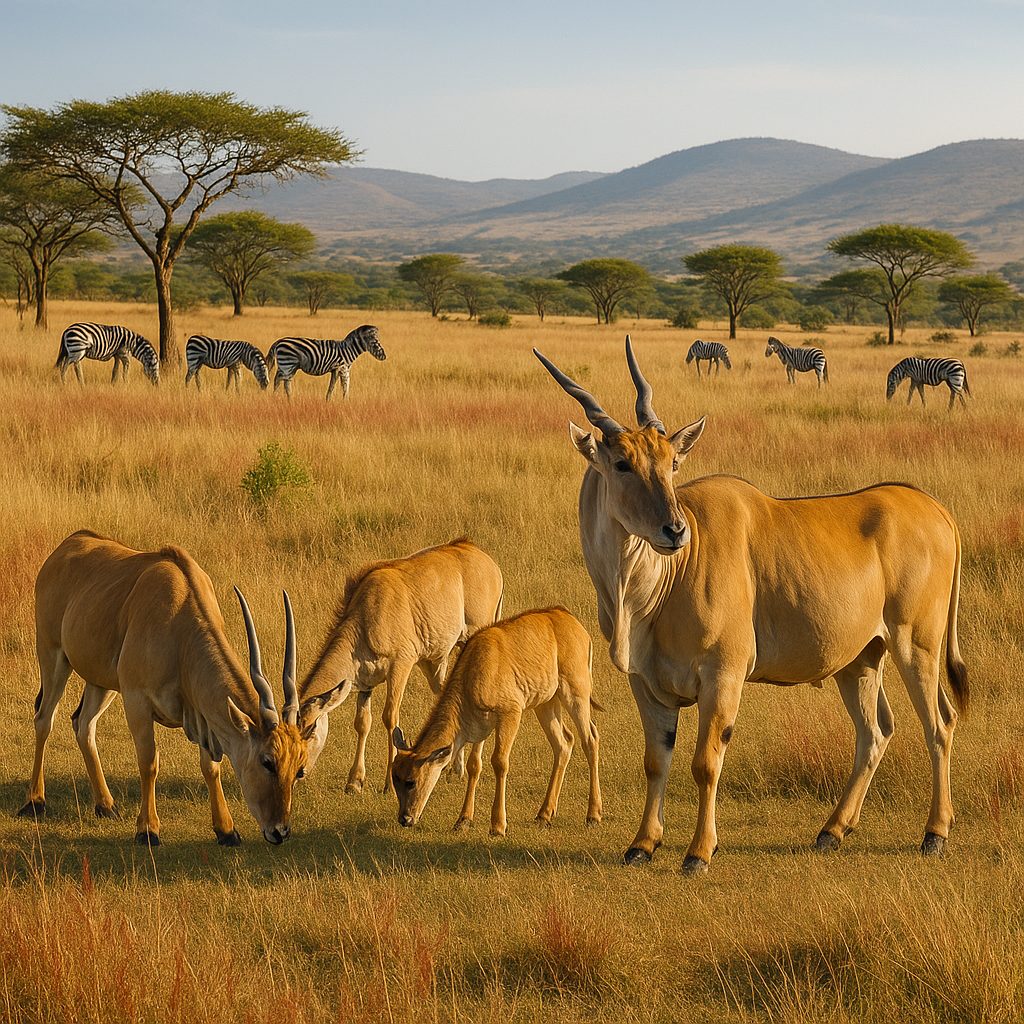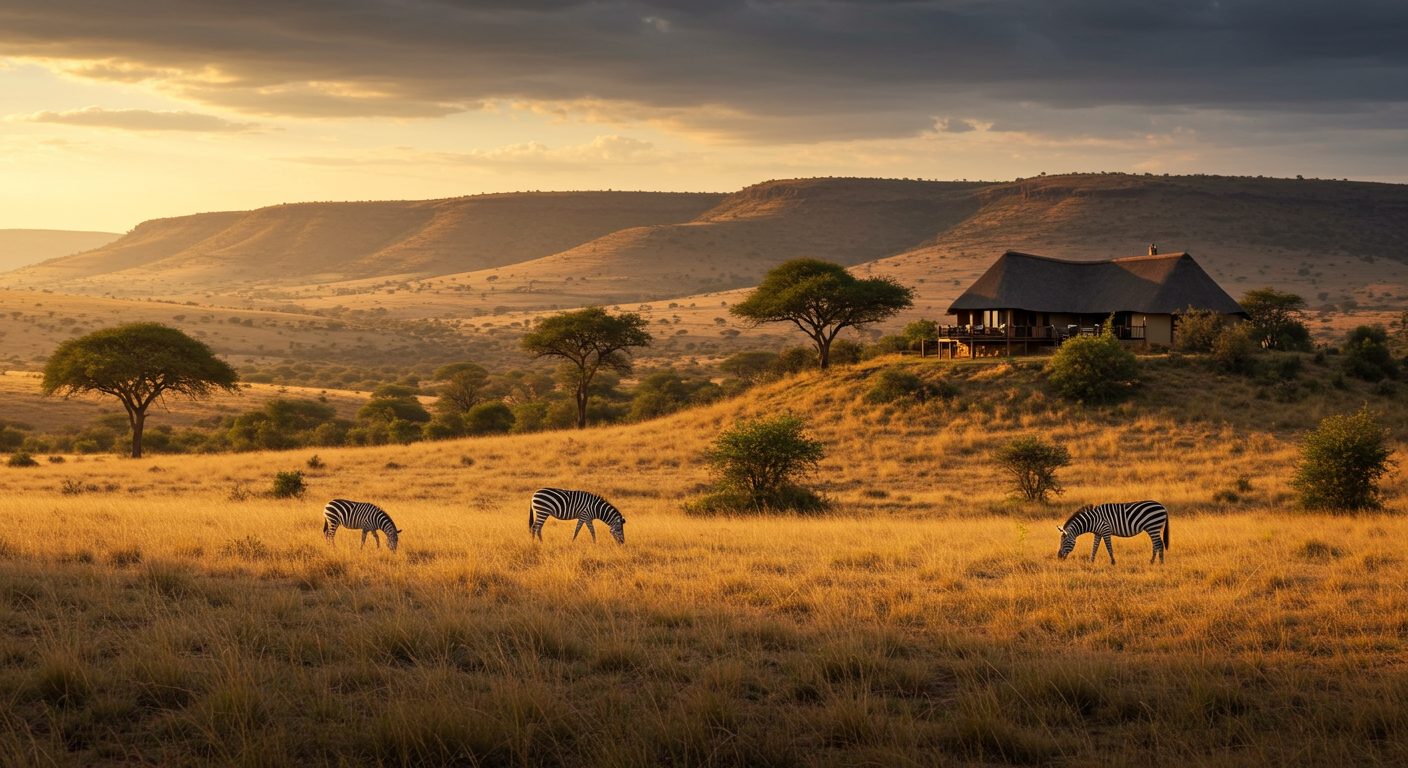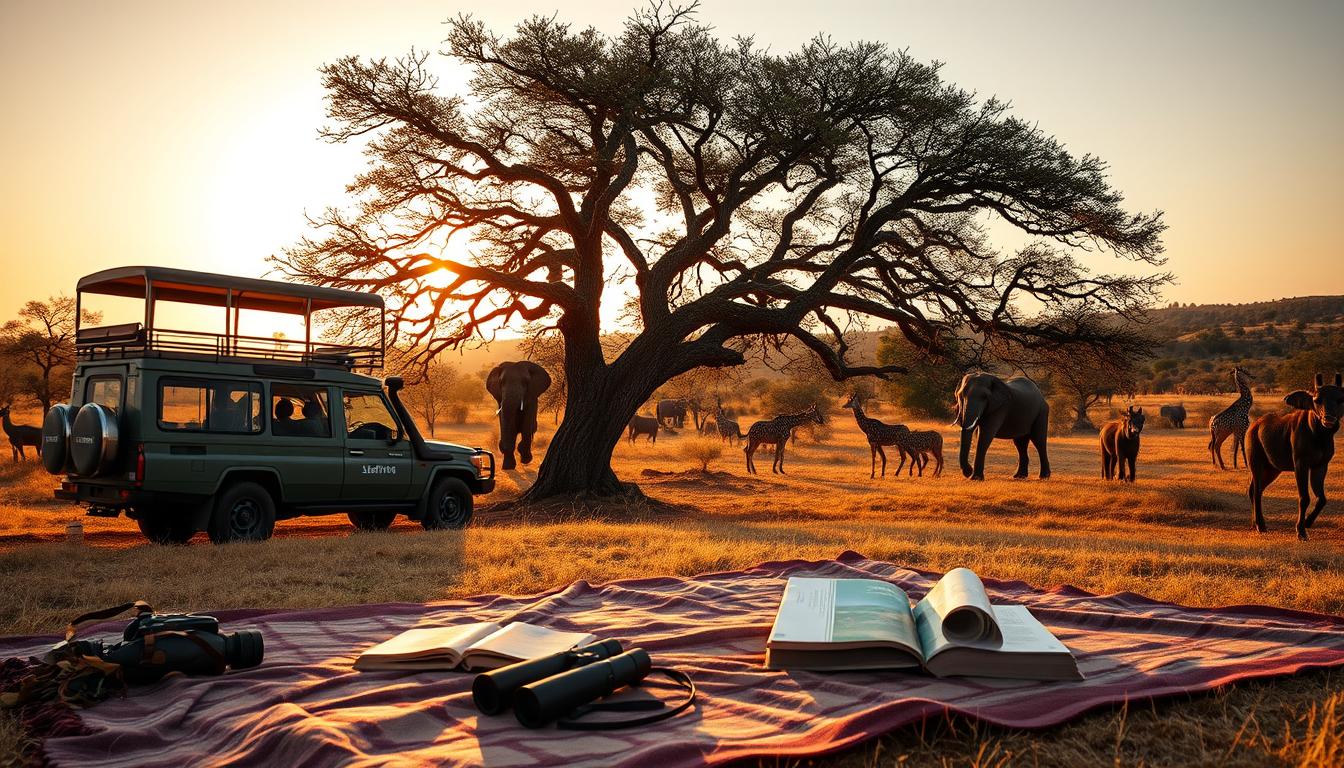A British Traveler’s Guide to SA Safari Etiquette: Do’s and Don’ts
Did you know that about 80% of places in South Africa take credit cards? This makes it a great spot for British travelers. With the exchange rate of South African Rand (ZAR) being around 18-20 ZAR to 1 British Pound (GBP), many are heading to South Africa for safaris. It’s key for British travelers to know SA safari etiquette for a safe and fun trip.
Knowing safari etiquette is crucial for a great South African safari. This guide will help British travelers have a memorable and respectful time. It’s not just about rules; it’s also about respecting local culture and nature. A British Traveler’s Guide to SA Safari Etiquette offers insights into safari etiquette, helping travelers understand South African culture.
Key Takeaways
- Approximately 80% of establishments in South Africa accept credit cards, reducing the need for cash transactions.
- A British Traveler’s Guide to SA Safari Etiquette is essential for navigating the dos and don’ts of safari etiquette.
- Respecting local customs and traditions is crucial for a safe and enjoyable holiday.
- Safari etiquette is not just about following rules, but also about being mindful of the local culture and environment.
- Understanding the cultural differences and adapting to the local way of life is vital for British travelers.
- A British Traveler’s Guide to SA Safari Etiquette will provide valuable insights into the world of safari etiquette.
- By following the guidelines outlined in this guide, British travelers can ensure a memorable and respectful experience.
American Celebrities Who Love South African Safaris (And Where They Stayed)
Understanding Safari Culture in South Africa
South Africa is famous for its lively safari culture. It’s deeply connected to the country’s history and traditions. When you go on a South African safari, knowing and respecting local customs is key. Being informed helps you enjoy your safari more by knowing the do’s and don’ts and following a good safari etiquette guide.
Respecting wildlife and the environment is a big part of safari culture. This means being careful with your actions and behavior. For example, keep a safe distance from animals and don’t litter. By doing this, you help protect South Africa’s amazing natural world.
For British travelers, knowing the differences between what they expect and what a South African safari really is is important. Being open-minded and flexible lets you dive into the local safari culture and make memories that last a lifetime. Some things to keep in mind include:
- Respecting local customs and traditions
- Following guidelines for wildlife interactions
- Being mindful of one’s behavior and actions during the safari
By following these principles and knowing the do’s and don’ts of safari etiquette, you can have a fun and safe South African safari experience. It will be memorable and responsible.
Essential Preparations Before Your Safari Adventure
Before you start your safari, it’s key to get ready right. Pack light, bring binoculars, and know safari tips and safari customs. Also, learn safari dos and don’ts to stay safe.
Pack comfy clothes like khaki, greens, and browns. They help you blend in. Don’t forget sunscreen, insect repellent, and a first-aid kit. Check the weather and pack a light raincoat if it might rain.
Here are some safari tips to remember:
- Drink lots of water all day
- Avoid walking alone at night
- Use safe taxis or services
- Respect local safari customs and traditions
By following these safari dos and don’ts, you’ll have a great safari. Stay informed, be respectful, and take care to make it a memorable trip.
Vehicle Etiquette and Safety Protocol
When you go on a safari, knowing the rules is key. You must follow speed limits and not drive over animal waste. It’s also important to respect the environment and the animals.
In game vehicles, always stay seated and don’t make sudden moves. This helps keep everyone safe and doesn’t scare the animals.
Talking to your guide is crucial. They can share lots of useful info about the animals and their homes. When taking photos, remember to keep your camera quiet and don’t use flash. Here are some important tips:
- Stay at least 10 meters away from the animals
- Avoid feeding or touching the animals
- Keep your voice down and avoid sudden noises
- Follow the guide’s instructions and stay in the vehicle at all times
By following these rules, you help make sure everyone has a good time. Always think about the animals and the environment. And always listen to what your guide says.
It’s also important to be aware of your surroundings. And to respect the local culture and customs. This way, you help make the experience better for everyone.
| Guideline | Importance |
|---|---|
| Stay seated and avoid sudden movements | High |
| Follow the guide’s instructions | High |
| Keep cameras in silent mode | Medium |
How to Plan a South African Safari from the USA: A Step-by-Step Guide
Wildlife Interaction Guidelines
Going on a safari adventure means you must focus on wildlife safety and follow safari etiquette. Keep a safe distance from animals, don’t feed them, and avoid loud noises. This keeps you safe and helps protect the animals and their homes.
Here are some important wildlife interaction rules:
- Keep a safe distance from animals to prevent crowding and aggressive behavior
- Don’t feed wild animals, as it can harm their behavior and health
- Avoid loud noises and sudden movements that may startle animals
Always be aware of your surroundings and keep a safe distance from animals. This is especially true when they’re eating or with each other. By following these rules and focusing on wildlife safety, you’ll have a memorable wildlife interaction experience. Plus, you’ll help protect these amazing animals.
Many safari operators, like The Travel Corporation, have strict safari etiquette rules. These rules help keep animals safe and tourists safe too. They include guidelines for responsible wildlife viewing, like not riding or sitting on wild animals, and not supporting places that keep animals for entertainment or profit.
| Guideline | Importance |
|---|---|
| Maintaining a safe distance | Prevents crowding and aggressive behavior |
| Not feeding wild animals | Prevents negative impacts on animal behavior and health |
| Avoiding loud noises | Prevents startling animals and disrupting their natural behavior |
A British Traveler’s Guide to SA Safari Etiquette: Do’s and Don’ts
As a British traveler, knowing and respecting local customs on an SA safari is key. This means trying traditional South African barbecue and exploring local markets. It’s important to respect these customs to enhance your safari experience.
When you meet local communities, be respectful and considerate. Know about cultural differences and don’t act rudely. British travelers should also keep their voices down and respect local traditions. Following these tips will make your safari trip better.
Also, dining etiquette is crucial for SA safari etiquette. Try local foods, like traditional South African dishes, and respect meal times and traditions. Being mindful of these customs shows respect for the local culture and enriches your experience.
Environmental Responsibility on Safari

Exploring Africa’s vast savannahs and grasslands reminds us of our duty to protect the environment. With over 13 million km² of savannah or grassland, our actions greatly affect the ecosystem. Sustainable practices like reducing waste, conserving water, and respecting wildlife habitats are key to preserving these areas’ natural beauty.
Good waste management is crucial to protect habitats and wildlife. Simple steps like proper trash disposal and avoiding single-use plastics can help a lot. Also, supporting conservation efforts by choosing eco-friendly tour operators and practicing responsible wildlife viewing is important. It helps protect the environment and ensures African wildlife’s survival.
Here are some ways to promote environmental responsibility on safari:
- Reduce energy use by using efficient equipment and turning off lights when not needed
- Save water by taking shorter showers and reporting leaks
- Respect wildlife habitats by keeping a safe distance and not littering
By following sustainable practices and supporting conservation efforts, we can protect Africa’s environment. Every small action we take can make a big difference. Together, we can create significant positive change.
| Environmental Responsibility Tips | Benefits |
|---|---|
| Reduce waste | Prevents habitat destruction and protects wildlife |
| Conserve water | Helps maintain healthy ecosystems and supports biodiversity |
| Support conservation efforts | Protects wildlife and preserves natural habitats for future generations |
Common Mistakes to Avoid During Your Safari
Going on a safari adventure means knowing common mistakes that can ruin your trip and harm the environment. A good safari etiquette guide will teach you what to do and what not to do.
Some big safari mistakes to steer clear of are yelling at animals, ignoring your guide, and throwing trash. These actions can mess up the animals’ homes and how they act. So, it’s key to follow a safari etiquette guide to have a good time and not harm the animals.
To enjoy your safari trip, here are some tips:
- Keep a safe distance from animals, about 100 yards for big ones and 50 yards for predators.
- Be quiet and still to see how animals naturally behave.
- Use a long lens for photos to not scare the animals away.
By knowing these common mistakes and following a safari etiquette guide, you help make your safari trip better. It’s important to respect the animals, your guide, and the environment for a fun and memorable trip.
By not making safari mistakes and following a safari etiquette guide, you help keep the safari beautiful for others in the future.
| Tip | Importance |
|---|---|
| Maintain a safe distance | Prevents disruption of natural habitat and behavior |
| Stay silent and still | Allows for observation of natural animal behaviors |
| Use a telephoto lens | Enables optimal wildlife photography without disturbance |
South Africa vs. Kenya: Which Safari Destination is Right for You?
Making Your Safari Experience Memorable While Respecting Traditions
As your safari experience in South Africa ends, it’s key to make lasting memories. You should also respect the local traditions and customs. Try a traditional South African barbecue or braai and explore local markets. Here, you can find unique handicrafts and artisanal products.
Being mindful and respectful of the traditions you meet is important. This means greeting locals in their language, dressing modestly, and following cultural protocols. A little cultural sensitivity can make your memorable safari truly special.
FAQ
What is the importance of understanding safari etiquette for British travelers visiting South Africa?
Understanding safari etiquette is key for British travelers in South Africa. It shows respect for local customs and enhances the safari experience. Safaris in South Africa have a rich history, and knowing the etiquette helps travelers enjoy the culture and nature.
What are some key differences between British traveler expectations and South African safari experiences?
British travelers might have different expectations than the South African safari. Knowing these cultural differences is vital for a respectful and enjoyable safari.
What are some essential preparations for British travelers before embarking on a safari in South Africa?
Before a safari in South Africa, British travelers should prepare well. They need to pack right, know safety and health rules, and get ready for a great adventure.
What are the guidelines for proper vehicle etiquette and safety protocol on a South African safari?
Vehicle etiquette and safety are crucial on a South African safari. Travelers should follow rules for game vehicles, communicate well with guides, and respect wildlife and nature through photography.
How should British travelers interact with wildlife during a South African safari?
Interacting with wildlife on a South African safari requires respect and caution. Travelers should keep a safe distance and avoid actions that could harm the animals. This ensures the animals’ well-being and a meaningful safari.
What are the key dos and don’ts for British travelers to follow when navigating the cultural landscape of a South African safari?
British travelers should be aware of local customs and etiquette on a South African safari. They should respect traditions, be culturally sensitive, and adapt to cultural differences for a richer safari experience.
What are the best practices for maintaining environmental responsibility during a South African safari?
Environmental responsibility is key on a South African safari. Travelers should manage waste, adopt sustainable practices, and support conservation to protect the environment and preserve it for future generations.
What are some common mistakes that British travelers should avoid during a South African safari?
British travelers should avoid disrespecting wildlife, guides, and the environment on a South African safari. Being mindful of one’s actions is crucial for a memorable and responsible safari.
How can British travelers make the most of their South African safari experience while respecting local traditions and customs?
To enjoy a South African safari while respecting local traditions, British travelers should be open-minded and willing to learn. Appreciating cultural differences and being respectful will make the safari unforgettable and enriching.










